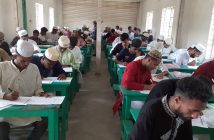IT Education and personnel
There are very few standard institutes who are giving high quality IT education inBangladesh, but their costs are so high that they are barely within reach of general peoples. Many private organizations have opened independent institutes, though highly dense inDhaka, are running with lack of proper syllabus and lack of acceptable technical qualities.
Building strong ICT infrastructure is the pre-requisite for makingBangladesha digital one. For this, we need to focus on the following relevant issues assessing the harsh reality that hinders our development in this context.
a) Power deficit: Latest statistics reveal thatBangladesh faces a power deficit of up to 2000 MW against a demand of 5000 MW daily. It may be noted that for proper ICT development an uninterrupted power supply is a must.
b) Network infrastructure: Outside Dhaka, at present a few computer network infrastructures have been developed so far. Apart from some educational institutes outside Dhaka, observation finds that most of the LAN setups areDhaka centric. This observation reveals the reality of the digital gap even within the country.
c) Use of Internet: For the ICT development Internet users of the country must be increased. In this case our position is the worst one among the South Asian countries. The latest statistics (ITU, 2007) revealed that Internet penetration in our country is only 0.3%. Whereas, inPakistan andIndia, it is 7.3% and 5.3% respectively.
d) Under sea submarine cable: Since 2006,Bangladesh has been connected to worldwideInternet Super High Way through an under sea submarine cable. But this single submarine cable frequently faces disruption resulting in slow bandwidth.
e) Network Readiness: Networked Readiness Index (NRI), developed by theUniversity ofHarvard, measures the propensity for countries to exploit the opportunities offered by information and communications technology. The NRI seeks to better comprehend the impact of ICT on the competitiveness of nations. The NRI is a composite of three components: the environment for ICT offered by a given country or community, the readiness of the community’s key stakeholders (individuals, businesses, and governments) to use ICT, and finally the usage of ICT amongst these stakeholders. Unfortunately, the latest survey (2006-7) revealed thatBangladesh’s NRI ranking is one of the lowest among the Asian countries.
f) Use of open source software: Many countries (e.g.France andMalaysia) have started to use open source software in ICT development projects for cost effectiveness. Unfortunately, in our ICT development domain the culture of using open source has not yet been introduced.
g) English literacy rate: From different sources, it has been learnt that, English literacy rate inBangladesh is less than one percent. Whereas, English literacy rates inIndia andPakistan are 60% and 20% respectively. There is a strong correlation between English literacy and ICT development in the present context of globalization. In the arena of ICT English has become the Lingua-Franca. On the other hand, we have not localized Bengali in the domain of computing. Hence, English literacy is a must for our ICT development. Unfortunately, in this case our position is the worst in the sub-continent.
Though the above accounts seem to be frustrating one, these can be easily overcome within a reasonable span of time if we can establish good governance in the country. Since independence,Bangladesh has been critically suffering from poor governance. Lack of vision, corruption, lack of transparency, weak coordination, undemocratic decision making were the salient features of our past governments. These can also be marked as the major barrier to the overall progress ofBangladesh. However, the newly installed government which has called for changes, hopefully, will establish much expected good governance to keep up with people’s aspiration.
For making a digital Bangladesh by 2021, the government must address the above stated issues effectively and efficiently in transparent manners. In many cases we need to reformulate our national policy (e.g. education policy, ICT policy) in accordance with the Millennium Development Goals. In reformulating the ICT policy, we will need to take a pragmatic and visionary approach so that it can curb the prevailing digital gap in the society. Moreover, the journey towards a digital Bangladesh needs the incorporation of the technologically solvent innovative younger generation. If the leaders of our country objectively guide this generation, they can do wonder for the nation. After all, the young generation always looks forward and they can help bring about positive changes in the society



